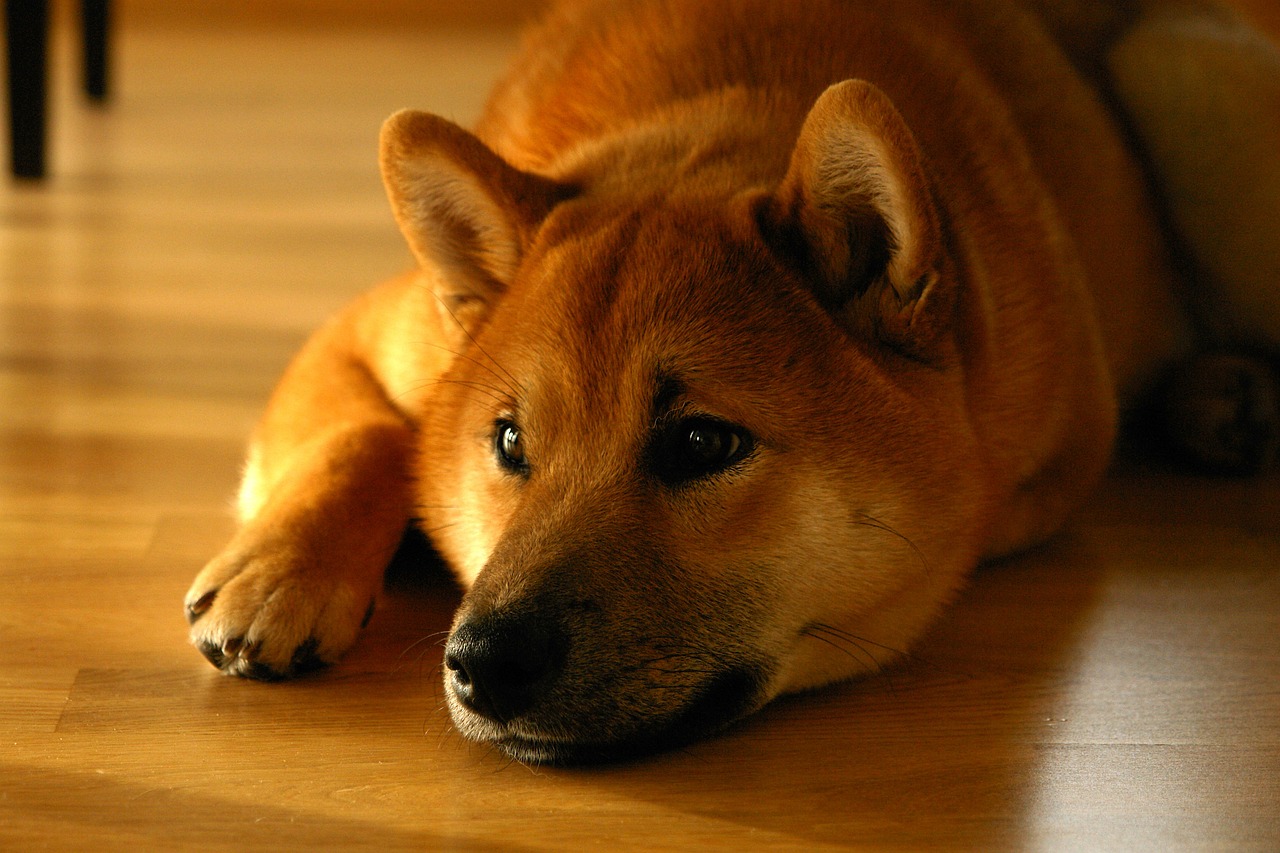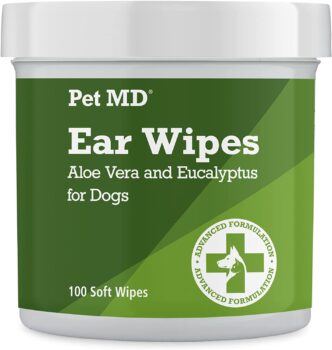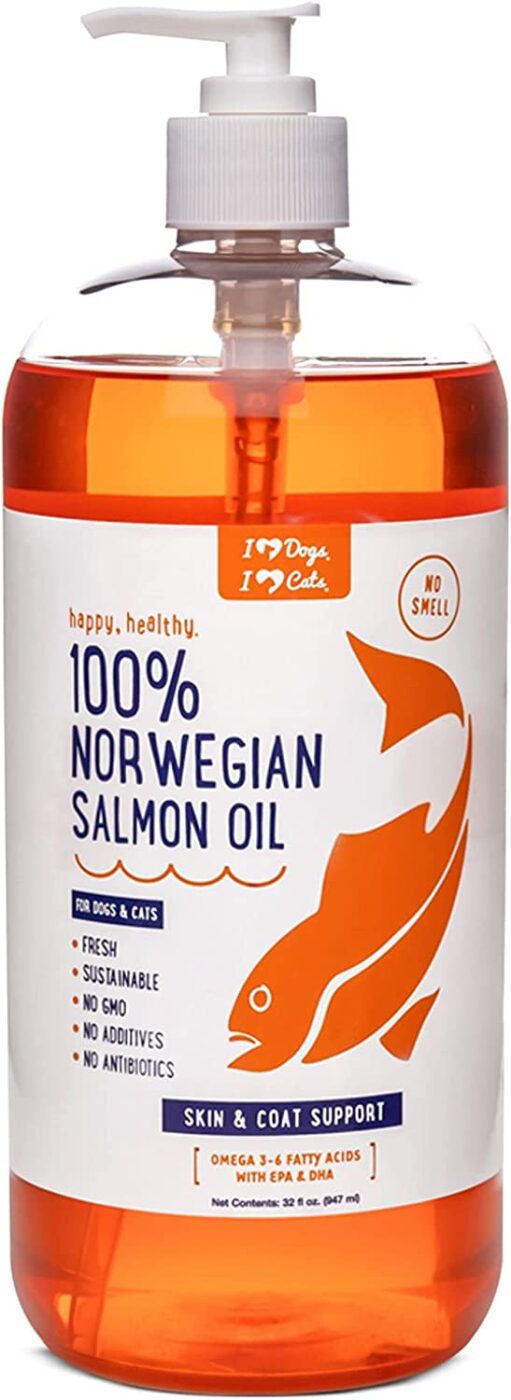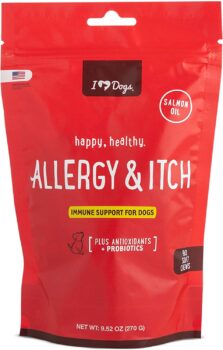Shiba Inus, with their striking fox-like appearance and spirited personality, are increasingly popular pets. They are typically a healthy breed, but, like all dogs, they can be susceptible to ear infections. This article outlines 11 ways to treat and prevent ear infections in Shiba Inus, with an emphasis on the importance of Omega-3 in their diet.

iHeartDogs is reader supported. Some of the links below may be paid affiliate links, where we receive a small commission on a product at no additional cost to you.
1. Regular Ear Checks and Cleaning
Check your Shiba Inu’s ears regularly for signs of infection such as redness, swelling, and unusual odor. Clean them gently using a vet-approved cleaner.
Our favorite ear cleaner is these PetMD brand ear wipes on Amazon.
2. Dry Ears After Exposure to Water
Whether after bathing or playing in the water, always ensure your Shiba Inu’s ears are thoroughly dried as moisture can promote bacterial growth and lead to infections.
3. Incorporate Omega-3 Fatty Acids in Their Diet
Omega-3 fatty acids are known for their anti-inflammatory properties, which can help manage allergies that often lead to ear infections. Add Omega-3-rich foods, like fish and flaxseeds, or supplements to their diet.
We’re fans of this Norwegian salmon oil on Amazon. It’s a bright orangish-pink color and has no fishy smell at all due to it’s ultra high purity.
4. Regular Vet Visits
Routine visits to the vet can help identify and address potential ear infections early, preventing their progression to more serious stages.
5. Identify and Avoid Allergens
If your Shiba Inu is allergic to specific foods or environmental factors, avoid these to reduce the risk of ear infections.
A few good supplements to help your dog’s allergies are apple cider vinegar, quercetin, and colostrum, all of which are found in many natural allergy supplements like this one.
6. Keep Up-to-date with Vaccinations and Parasite Control
Ensuring that your Shiba Inu’s vaccinations are current and that they’re consistently treated for parasites can strengthen their immune system and lower their risk of infections.
7. Use Vet-prescribed Medications
For existing ear infections, your vet may prescribe antibiotics or antifungal medications. Ensure you follow the prescribed dosage and duration to effectively treat the infection.
8. Consider Surgical Intervention for Chronic Cases
For chronic or severe cases, surgical intervention might be necessary to provide better aeration and drainage of the ear canal. Discuss this option with your vet if necessary.
9. Give Your Shiba Inu Probiotics
Probiotics can support a healthy gut, which contributes to a stronger immune system. This can potentially lower your dog’s risk of infections.
10. Use E-Collars During Treatment
An e-collar can prevent your Shiba Inu from scratching and further irritating their infected ears during treatment.
11. Maintain Clean Living Conditions
Keeping your Shiba Inu’s living environment clean can help prevent various health issues, including ear infections.
FAQs on Ear Infections in Shiba Inus
1. Q: What are the signs of an ear infection in Shiba Inus?
A: Signs include frequent scratching, head shaking, redness, swelling, abnormal discharge, and a foul odor from the ears.
2. Q: Are Shiba Inus more prone to ear infections?
A: Shiba Inus are not more prone to ear infections than most other breeds, but individual dogs may have a higher risk due to factors such as allergies or a weak immune system.
3. Q: How often should I clean my Shiba Inu’s ears?
A: Healthy Shiba Inu’s ears should be cleaned once a week. If they are prone to infections, more frequent cleaning may be necessary.
4. Q: Can Omega-3 in their diet prevent ear infections?
A: Omega-3 fatty acids can help control inflammation caused by allergies, potentially reducing the risk of ear infections.
5. Q: Can ear infections cause permanent damage in Shiba Inus?
A: If left untreated, ear infections can lead to severe complications, including hearing loss. Prompt treatment is essential.
6. Q: Can I use human ear infection medicine on my Shiba Inu?
A: No, always use medications prescribed by your vet. Human medications may not be safe or effective for dogs.
7. Q: What are common allergens for Shiba Inus?
A: Common allergens can include certain food ingredients, dust mites, pollen, and certain cleaning products.
8. Q: How can I incorporate Omega-3 in my Shiba Inu’s diet?
A: Omega-3 can be added to your dog’s diet through supplements or Omega-3-rich foods like fish and flaxseeds.
9. Q: Can I completely prevent ear infections in my Shiba Inu?
A: While not all ear infections can be prevented, regular ear cleaning, a balanced diet, and limiting allergen exposure can significantly reduce the risk.
10. Q: What should I do if my Shiba Inu’s ear infection keeps recurring?
A: Recurrent ear infections may indicate an underlying issue, such as allergies or an anatomical problem. Consult your vet for a comprehensive examination and treatment plan.
In conclusion, adopting these strategies can help keep your Shiba Inu’s ears healthy and infection-free. Early detection and prompt treatment are key to ensuring your Shiba Inu’s health and well-being.



 Toledo, United States.
Toledo, United States.
